The expiration of key provisions of the 2017 tax law at the end of 2025 sets the stage for one of the most consequential tax debates in a generation. The networks of the National Council of Nonprofits are committed to identifying and promoting fundamental tax policy proposals that will enhance the abilities of organizations to advance their missions in communities while working to ensure that adverse policies, including benign proposals with identifiable, adverse consequences, are not adopted.
Proposals
Better Employment Tax Policies for Nonprofits
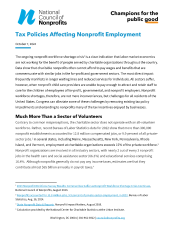
the full paper.
The ongoing nonprofit workforce shortage crisis is a clear indication that labor market economics are not working for the benefit of people served by charitable organizations throughout the country. Data show that charitable nonprofits often cannot afford to pay wages and benefits that are commensurate with similar jobs in the for-profit and government sectors. The most direct impact frequently manifests in longer waiting lines and reduced services for individuals. All sectors suffer, however, when nonprofit child care providers are unable to pay enough to attract and retain staff to care for the children of employees of for-profit, governmental, and nonprofit employers. Nonprofit workforce shortages, therefore, are not mere inconveniences, but challenges for all residents of the United States. Congress can alleviate some of these challenges by removing existing tax policy impediments and extending to nonprofits many of the tax incentives enjoyed by businesses.
- Tax Policies Affecting Nonprofit Employment, National Council of Nonprofits, October 7, 2024.
Making the Case for Charitable Giving Tax Incentives
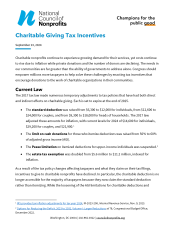
the full paper.
Charitable nonprofits continue to experience growing demand for their services, yet costs continue to rise due to inflation while private donations and the number of donors are declining. The needs in our communities are far greater than the ability of governments to address alone. Congress should empower millions more taxpayers to help solve these challenges by enacting tax incentives that encourage donations to the work of charitable organizations in their communities.
- Charitable Giving Tax Incentives, National Council of Nonprofits Policy Paper, September 23, 2024.
Charitable Nonprofits: Nonpartisan in Law, Fact, and Purpose
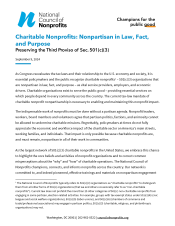
the full paper.
As Congress reevaluates the tax laws and their relationship to the U.S. economy and society, it is essential policymakers and the public recognize charitable nonprofits – 501(c)(3) organizations that are nonpartisan in law, fact, and purpose – as vital service providers, employers, and economic drivers. Charitable organizations exist to serve the public good – providing essential services on which people depend in every community across the country. The current tax-law mandate of charitable nonprofit nonpartisanship is necessary for enabling and maintaining this
- Charitable Nonprofits: Nonpartisan in Law, Fact, and Purpose, National Council of Nonprofits Policy Paper, September 9, 2024.
Natural Disaster Tax Relief
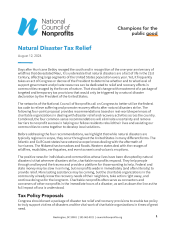
the full paper.
Days after Hurricane Debby ravaged the south and in recognition of the one-year anniversary of wildfires that devastated Maui, it is undeniable that natural disasters are a fact of life in the 21st Century, affecting large segments of the United States population every year. Yet, it frequently takes an act of Congress or decree of the President to determine whether and to what level of support government and private resources can be dedicated to relief and recovery efforts in communities ravaged by the forces of nature. That should change with enactment of a package of targeted and temporary tax provisions that would only be triggered by a natural disaster declaration by the President of the United States.
- Natural Disaster Tax Relief, National Council of Nonprofits Policy Paper, August 12, 2024.
Removing Tax Code Impediments to Volunteering
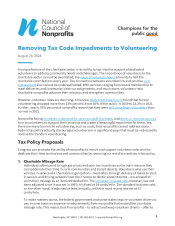
the full paper.
A unique feature of the charitable sector is its ability to tap into the devotion of legions of dedicated volunteers to address community needs and challenges. With services ranging from board membership and hospital supports to meal deliveries and community clean-up projects, and much more, volunteers help charitable nonprofits advance their missions and strengthen communities. Many nonprofits facing increases in demand for services, staff shortages, and drops in revenue sources turn to volunteers to support their missions and create a meaningful experience for them. However, volunteer rates are declining. There are many barriers to volunteering, such as costs, that nonprofits cannot address alone. Federal tax policy actually discourages volunteerism in significant ways that must be redressed to reverse the trends in volunteering.
- Removing Tax Code Impediments to Volunteering, National Council of Nonprofits Policy Paper, August 26, 2024.
More About Tax Policy
Natural Disaster Tax Relief
Right now, residents in virtually every state are suffering from a natural disaster. And charitable nonprofits are right there with them providing relief, recovery, and support.
Removing Tax Code Impediments to Volunteering
The importance of volunteers to the charitable sector cannot be overstated; the value of volunteer hours amounts to half the charitable contributions every year.
Protecting the Johnson Amendment and Nonprofit Nonpartisanship
A charitable nonprofit may “not participate in, or intervene in ... any political campaign on behalf of (or in opposition to) any candidate for public office.”
